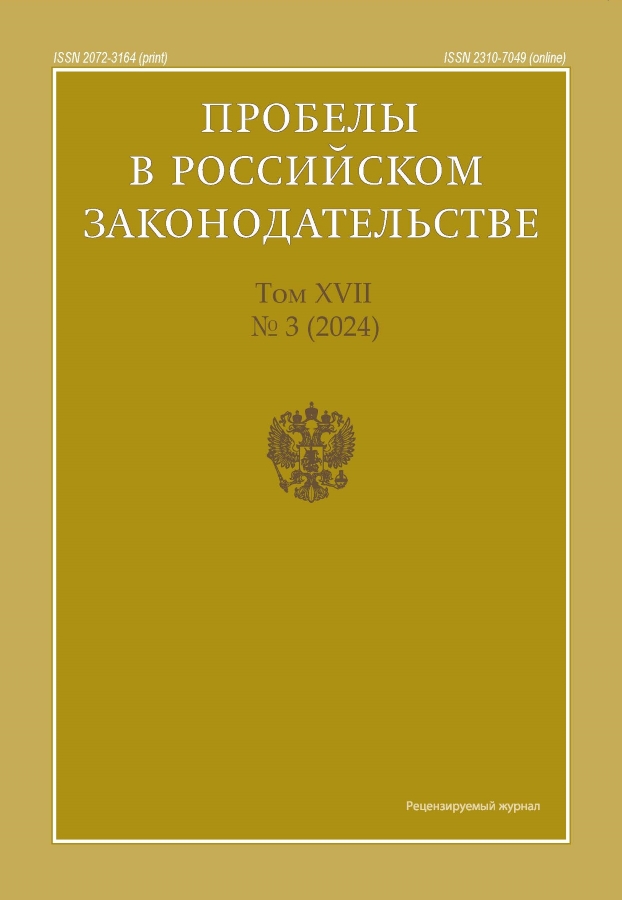Conceptual Model of Legal Regulation of Digitalization of Rights and Freedoms in the Russian Federation
- 作者: Kanakova A.E.1
-
隶属关系:
- Altai State University
- 期: 卷 17, 编号 3 (2024)
- 页面: 44-52
- 栏目: Public Law (State Law) Sciences
- URL: https://journals.eco-vector.com/2072-3164/article/view/634204
- DOI: https://doi.org/10.33693/2072-3164-2024-17-3-044-052
- EDN: https://elibrary.ru/LVDTFV
- ID: 634204
如何引用文章
详细
The purpose of the research is to form a conceptual model of legal regulation of digital rights and freedoms in Russia. The article considers the problems of implementation of legal regulation of the process of digitalization of rights and freedoms. Despite the popularity of the stated research topic, today there is no unified comprehensive approach to the regulation of this sphere. Significant lag of the legislator from technological progress predetermines the need to rethink the approaches to the stated topic available in legal science. Results. For the reason that technologies offer different opportunities, the most correct is the differentiation of legal regulation of digitalization of rights and freedoms by the specified criterion. Thus, if an action committed in the digital space has an analog in the offline world, there is no need to create a new legal category, in this case it is necessary to amend the existing normative provisions. If there is no offline analog, it is more logical to talk about a new legal regulation within a separate field of law. The presented hypothesis was confirmed in this research through the analysis of such generalized categories as "digital life" and "digital immortality".
全文:
作者简介
Anna Kanakova
Altai State University
编辑信件的主要联系方式.
Email: kananna19@yandex.ru
SPIN 代码: 2367-5878
Scopus 作者 ID: 795317
Cand.Sci.(law), Associate Professor of the Department of Constitutional and International Law
俄罗斯联邦, Barnaul参考
- Hayles N.K. How we became posthuman : Virtual bodies in cybernetics, literature and informatics / N. K. Hayles. K. Hayles // Chicago : University of Chicago Press. 1999. 364 p.
- Dobrobaba M.B. Dipfakes as a threat to human rights // Lex russica. 2022. Vol. 75. № 11(192). P. 112-119.
- Erokhina Y.V. Tokhtueva E.A. Model of digital twin in the context of digital after-death: legal analysis // Information Society. 2023. № 1. P. 77-87.
- Kirillova E.A., Zulfugarzade T.E., Metelev S.E. Institute of digital rights in the civil law of Russia // Pravoprimenenenie. 2022. Vol. 6. № 1. P. 245-256.
- Lexin V.N. Man on the market of artificial intelligence // Free Thought. 2020. № 3 (1681). P. 29-44.
- Nazarov V.N. Digital twin as a subject of information ethics // Ethical thought. 2020. Vol. 20. №. 1. P. 142-154.
- Nazarova Y.V. Problems of immortality in the context of digital ethics // Society: philosophy, history, culture. 2021. № 11. P. 17-21.
- Nazarova Y.V. Ethics of postmortem in the conditions of digital reality // Humanitarian Vedomosti of L.N. Tolstoy Tula State Pedagogical University. 2021. № 2 (38). P. 31-38.
- Nikushina V.B., Zolotukhina Y.V., Morgun A.N., Zhukova V.I. Modulating function of cyber-space in the meaning-making attitude to death: a review and analytical analysis // Izvestia South-West State University. Series: Linguistics and pedagogy. 2019. Vol. 9 № 2 (31). P. 148-159.
- Rudova A.A. From digital profile to digital immortality: conceptualization of the problem field // Vestnik GSOTU. Humanities and socio-economic sciences. 2021. Vol. VXII. NO. 2 (24). P. 44-57.
- Runaev T.A. Virtual cemeteries as commemorative practices: varieties and vectors of development // Vestnik ASU. 2019. № 3 (244). P. 111-119.
- Soldatkina O.L. Digital law: features of the digital environment and subjects // State and Law. 2019. № 12. P. 113-123.
- Fedyulina E.V. Idea of technological immortality of man in the philosophy of posthumanism // Vestnik VSU. Series: Philosophy. 2020. № 4. P. 84-92.
补充文件








